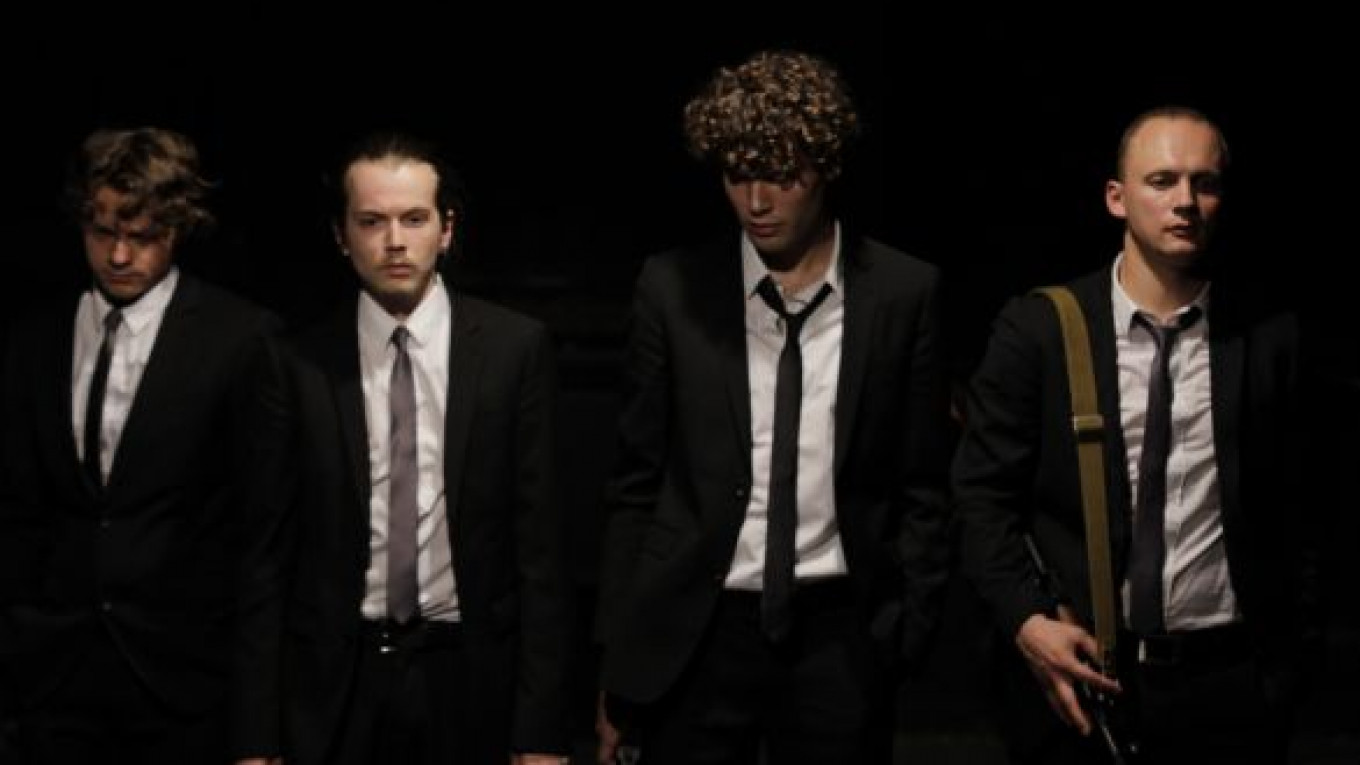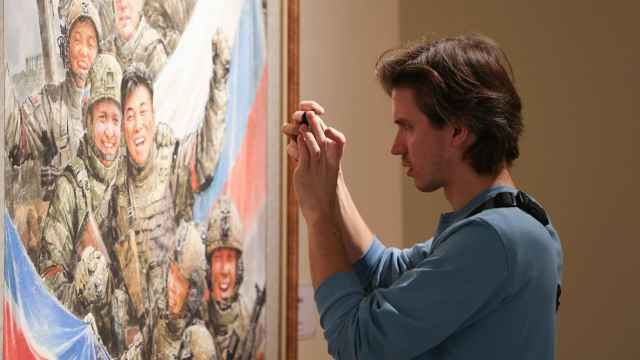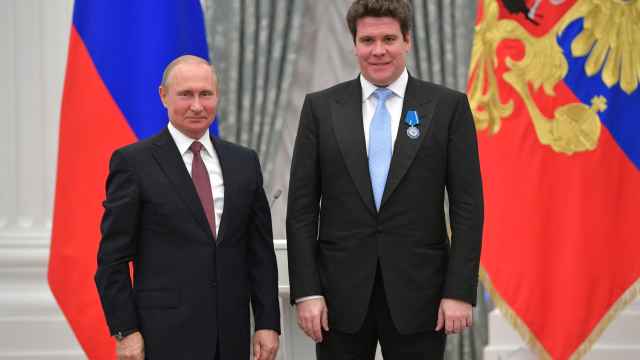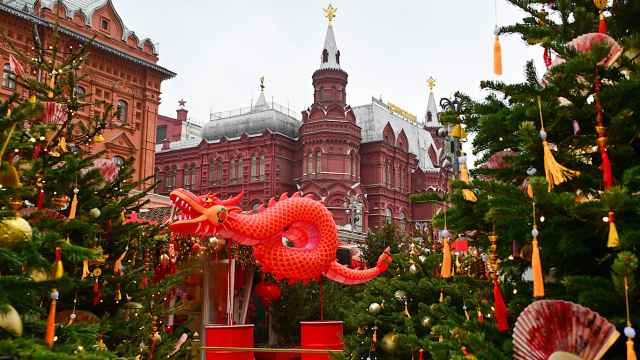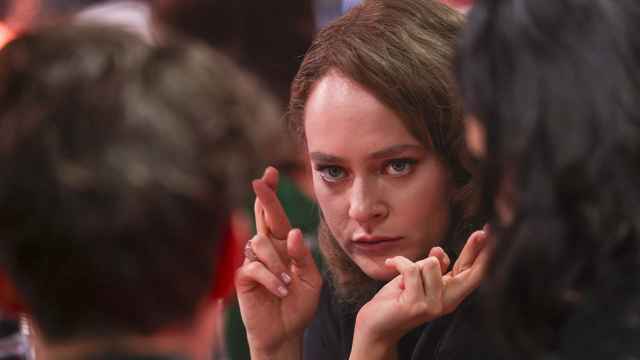Natalya Moshina’s “Heat,” the newest play at Praktika Theater, is an unusual work. We are blessed with the riches of new plays good, bad and indifferent about the contemporary psyche. We have modern confessions, fashionable takes on fashionable lives, and portraits of the down-and-out. We even have (some) political plays. But I don’t remember seeing anything quite like “Heat.”
What sets it apart is that it riffs on reality and things that seem possible in reality, but which are, in fact, the figment of an active imagination. This is not docudrama, although it plays around with the genre. It is not straight political drama, although it makes bold political statements. Moshina wrote her play as any playwright might have 50 or 100 years ago, devising characters and putting them into situations that test their mettle and challenge our beliefs.
Instead of a melodramatic love story, however, she wrote a kind of melodrama about terrorism. Even more to the point, perhaps, she wrote a melodrama about political dissent.
Anyone who follows current events will understand well that the only reasonable way to approach the topic of Russian politics is through melodrama — or, perhaps, sitcom, which also is echoed at times in “Heat.”
The play focuses on four intelligent, sensitive young men who are fed up with life as it is. Their cause is rather tame — they want pop music to be sung in Russian — but they are ready to put themselves on the line for their beliefs. They seize a building, threatening to kill hostages and blow up everything around them.
This, however, is when they make an unexpected discovery — nobody cares in the least. Neither the press, nor the police pay them the slightest mind.
Confused and despairing, the group leader Zimorodok (Ivan Makarevich) puts in an appearance at the police station and demands to be arrested. A whole string of cops, played with hilarious monotony and invention by Boris Kamorzin, infuriate the young terrorist even more as they ignore him by playing sonatas on the piano, insisting that they have no idea what he is talking about, or confessing quietly that they do know what he is up to but that they will defeat him by ignoring him utterly.
One police inspector is incredulous when he learns that Zimorodok’s group seized only 40 hostages.
“Why not 1,000?” the policeman asks. He is thoroughly amused to learn that not one hostage has been killed and suggests that someone might notice if they were to kill 50.
The absurdity, the cynicism and the truth of such conversations strike home effectively in Vladimir Ageyev’s crisp, unadorned production. Designer Marina Filatova’s mostly empty stage and well-dressed terrorists add to the clarity.
Twenty-four years ago, says one cop, “we used to send people out to every public gathering.” That was until they learned that you win battles like this by not playing the game at all. He who ignores everything the longest will emerge the victor.
With all its resources, the state apparatus is best equipped to play that waiting game.
A human, burdened with nerves, is more likely to crack. And that is just what happens to Rys (Mikhail Gorsky), one of the gang of four. Unable to bear the pressure and humiliation of no one paying any mind to his demands, he commits suicide.
That is no problem for the police either. They plant a story in the press that the victim was a worker carrying construction explosives that were detonated by accident. The story of the group’s protest remains buried under lies and indifference.
“Heat” is not a detective story. It begins with Rys’ mother standing over the dead body of her son in the morgue and progresses backward to the events that set that sad moment up.
As such, it is a simple and straightforward tale that mixes the fantastic (the oddly motivated terrorist attack), and the utterly recognizable (the powers-that-be standing back to allow mayhem to work itself out).
Aside from the hilarious scenes in the police station, another highlight in “Heat” is a long scene depicting the terrorist Sokol (Pavel Artemyev) unleashing a near-violent attack on one of his hostages (Danila Arikov) for not giving a damn about the country, and for allowing himself to be sedated by success, money and comfort.
“Heat” is topical and political. It is funny and true. It comes as a breath of fresh air at a time when the Russian electoral season is, itself, heating up.
“Heat” (Zhara) plays Thurs. and Sat. at 8 p.m. at Praktika Theater, located at 30 Kozikhinsky Pereulok. Metro Pushkinskaya, Mayakovskaya. Tel. 544-5545. . Running time: 1 hour, 20 minutes.
A Message from The Moscow Times:
Dear readers,
We are facing unprecedented challenges. Russia's Prosecutor General's Office has designated The Moscow Times as an "undesirable" organization, criminalizing our work and putting our staff at risk of prosecution. This follows our earlier unjust labeling as a "foreign agent."
These actions are direct attempts to silence independent journalism in Russia. The authorities claim our work "discredits the decisions of the Russian leadership." We see things differently: we strive to provide accurate, unbiased reporting on Russia.
We, the journalists of The Moscow Times, refuse to be silenced. But to continue our work, we need your help.
Your support, no matter how small, makes a world of difference. If you can, please support us monthly starting from just $2. It's quick to set up, and every contribution makes a significant impact.
By supporting The Moscow Times, you're defending open, independent journalism in the face of repression. Thank you for standing with us.
Remind me later.



